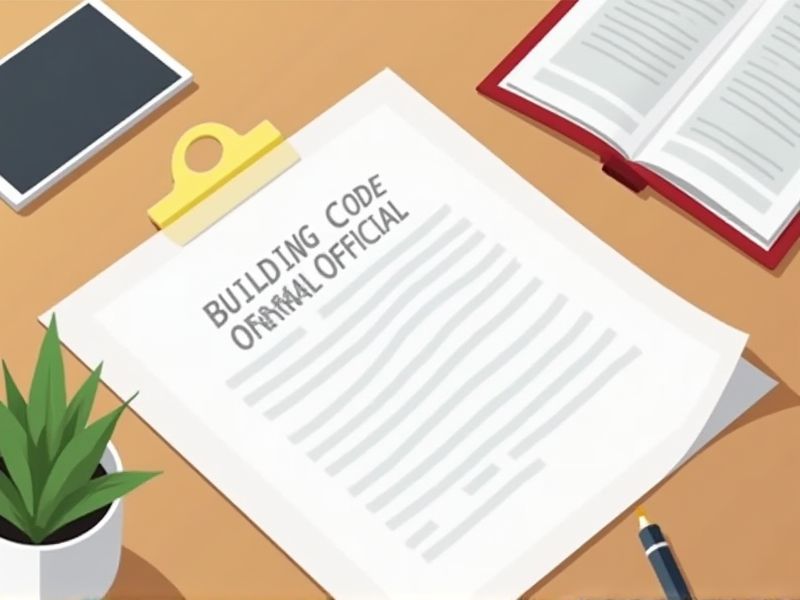
Building Code Officials play a crucial role in ensuring structures comply with safety and regulatory standards, heavily impacting public safety and infrastructure reliability. Certifications provide these professionals with the necessary technical knowledge and legal understanding to enforce building codes effectively. By obtaining specified certifications, they demonstrate competency and commitment to maintaining industry standards. These are some important certifications you may need as a Building Code Official.
ICC Certified Building Official (CBO)
ICC Certified Building Officials (CBOs) are essential to ensure that construction projects comply with established safety standards. Their comprehensive understanding of building codes helps prevent structural failures and ensures occupant safety. CBOs play a crucial role in interpreting and enforcing complex regulations, which reduces inconsistencies in construction practices. Their certification provides assurance to stakeholders that the building process meets national and local code requirements.
ICC Certified Code Enforcement Officer (CCEO)
A ICC Certified Code Enforcement Officer (CCEO) ensures compliance with building codes, which is vital for the safety and integrity of structures. Their expertise in reviewing plans and conducting inspections prevents potential hazards and structural failures. Involving a CCEO helps local governments enforce regulations efficiently, reducing the risk of legal and financial liabilities. The CCEO's knowledge aids in staying updated with current codes and technology, promoting sustainable and resilient building practices.
ICC Certified Residential Inspector (CRI)
The ICC Certified Residential Inspector (CRI) ensures compliance with standardized building codes, which enhances the safety and longevity of residential structures. Their expertise helps identify potential construction failures, reducing the risk of costly repairs and safety hazards. Building Code Officials rely on CRIs to maintain rigorous oversight, which ensures uniform application of building regulations across projects. This certification instills confidence among homeowners and stakeholders by validating the inspector's capability to evaluate structural integrity according to current codes and standards.
ICC Certified Commercial Inspector
Certified Commercial Inspectors bring expertise in identifying compliance issues, ensuring that buildings meet all safety and regulatory standards. Their certification process involves rigorous testing and continual education, leading to more thorough inspections. In-turn, building code officials rely on these inspectors to maintain consistency and accuracy in enforcement. This collaboration results in safer, more reliable structures, reducing potential liabilities for municipalities.
Certified Fire Protection Specialist (CFPS)
A Certified Fire Protection Specialist (CFPS) is essential for a Building Code Official to ensure compliance with fire safety regulations and standards, minimizing risks associated with fire hazards. Expertise in fire protection allows for the accurate interpretation and application of complex fire codes, ensuring buildings meet safety requirements and protect occupants. By integrating fire protection knowledge, officials can make informed decisions that enhance public safety and reduce potential liabilities. The presence of a CFPS bolsters a building department's credibility, reinforcing public trust in the official's ability to maintain safe and compliant structures.
LEED Accredited Professional (LEED AP)
Building Code Officials often require a LEED Accredited Professional (LEED AP) to effectively integrate sustainable design principles into building projects. The LEED AP expertise enhances their ability to assess compliance with environmental standards. By understanding sustainable practices, these officials can help minimize the environmental impact of construction. Implementing green building practices can lead to energy-efficient structures and reduced operational costs.
Certified Construction Inspector (CCI)
Certified Construction Inspectors ensure that construction projects comply with building codes, which is critical for maintaining safety and structural integrity. Their expertise in construction standards aids building code officials in identifying and addressing potential violations or discrepancies promptly. By having a CCI involved, the likelihood of construction defects and subsequent costly repairs or legal issues decreases. Incorporating a CCI into the inspection process supports efficient project timelines and reinforces public trust in construction practices and outcomes.
Certified Construction Manager (CCM)
Certified Construction Managers bring an in-depth understanding of complex construction projects, ensuring compliance with building codes. Their expertise reduces the risk of delays and costly errors by overseeing project timelines and resources effectively. Their knowledge in safety standards and regulations enhances the quality and safety of constructions. Having a CCM in the role enhances trust and credibility among stakeholders, facilitating smoother project execution and approvals.
Certified Safety Professional (CSP)
The Certified Safety Professional (CSP) is needed for a Building Code Official because it provides a comprehensive understanding of safety regulations, ensuring that buildings are designed and maintained to prevent hazards. This certification equips officials with the expertise to evaluate complex construction projects and enforce safety standards effectively. Having a CSP credential demonstrates a commitment to continuous learning in building safety, thereby enhancing public trust and credibility. By integrating advanced safety knowledge, Building Code Officials can proactively address potential risks, reducing accidents and liability issues in the construction industry.
OSHA 30-Hour Construction Outreach Training Program
The OSHA 30-Hour Construction Outreach Training Program enhances a Building Code Official's understanding of safety standards, crucial for ensuring regulatory compliance on job sites. Proper safety knowledge aids in reducing workplace accidents, leading to fewer project delays and lower liability risks. Comprehensive training empowers officials to identify potential hazards more effectively, contributing to a safer work environment. Informed officials can enforce codes more consistently, supporting overall construction quality and integrity.
Summary
You will see improved compliance and safety when a Building Code Official obtains certifications. This can lead to more efficient building processes and fewer project delays. Their advanced knowledge reduces errors in design and construction. Communities benefit as safer structures enhance public trust and satisfaction.
